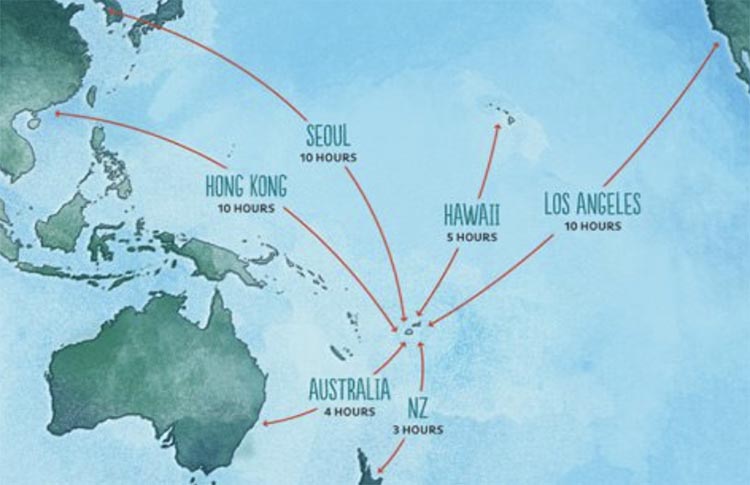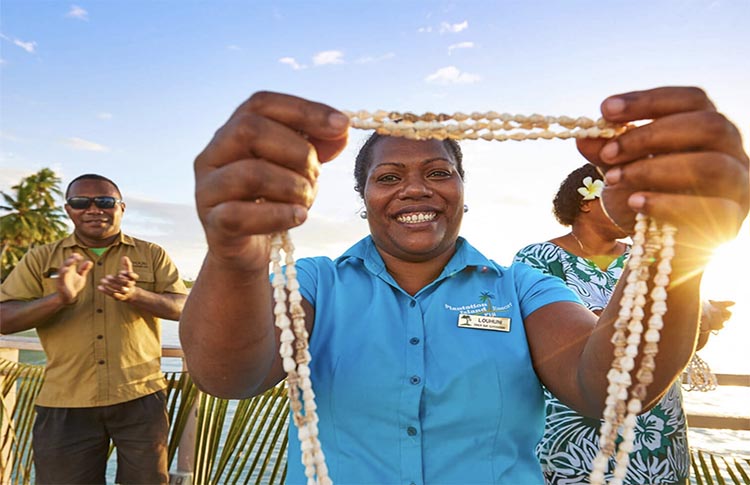
Are you keen to make the most of your time in South Pacific?
Maybe you’ve pondering a hop over to Fiji while you’re visiting Australia?
We can not only help with that but the First Light travel team have collated all the things you need to know about a combined Fiji Australian vacation package.

Contents
- How far is Fiji from Australia?
- What are the flight times to Fiji from Australia’s main cities?
- What is Fiji known for?
- What is the time difference between Fiji and Australia?
- What airport do you fly into for Fiji?
- When is the best time to visit Fiji?
- Is Fiji closer to Australia or New Zealand?
- What language do they speak in Fiji?
Discover the paradise of Fiji...
Visiting Australia is an exciting prospect in itself, but how about combining your trip with one of the most popular Pacific islands at the same time? What a great idea! Not sure what the ins and outs are of combining a Fiji holiday with your Australia trip? No worries, the experts at First Light Travel have come up with the basics you need to know while planning your adventures.
The time to visit the paradise island of Fiji has come, especially if you are already planning a trip to Oz. The (relatively) close vicinity of the South Pacific means that you can mix up your vacation to include the buzzing cities and dusty wildlife-filled outback of Australia with the white sand beaches and aqua hued crystal clear waters of over 300 islands that make up the Fiji archipelago.
Read on to top up your Fiji knowledge:
How far is Fiji from Australia?
First things first, the archipelago of Fiji is located eastwards of Australia and takes approximately 4 hours by plane from its east coast. Distance-wise that’s roughly 4,644 km (or 2,886 miles) if you fly by the most direct route.

What are the flight times to Fiji from Australia’s main cities?
Direct flights can be taken from a selection of Australia’s state capitals and flight times differ accordingly:
From Sydney to Fiji: 4 hours
From Brisbane to Fiji: 3 hours 30 minutes
From Melbourne to Fiji: 4 hours 45 minutes
Other Australian state capitals like Perth have indirect flight options with stopovers in Sydney, Brisbane or Melbourne which increases the flight times.
For example:
From Perth to Fiji: 11 hours (including a 3-hour connection through Sydney).
For international travellers, we recommend connecting to Fiji through one of the main Australian centres - Sydney, Melbourne or Brisbane - and including these as part of your international travel package plans as this will give you the best price and luggage capacity options.
Want to know more about flight times to Fiji in combination with your Australian itinerary - just Contact Us.

What is Fiji known for?
The archipelago of Fiji is most famous for its idyllic 333 tropical islands, which look like they come straight out of a postcard. Clear vibrant blue waters filled with coral reefs - Check! Pristine white-sand beaches lined with palm trees - Check! Lush green rolling hills - Check!
The islands are the epitome of a South Pacific paradise and enjoy a boatload of fascinating culture, laid-back living and adventure-packed activities to boot. Music and song are a big part of everyday life in Fiji along with delicious feasts cooked in a traditional ‘lovo’ underground oven.
Suva, located on the eastern side of the largest island of Viti Levu, is the capital and a port city with fascinating British colonial architecture. Nadi, on the western side of the island, is Fiji's main international gateway and closest to the largest resorts on the Coral Coast and Denarau Island.

What is the time difference between Fiji and Australia?
A great thing about including Fiji in your travels plans with Australia is that the time difference is small so you won’t be struggling with additional jet lag in the middle of your getaway! Since Australia is so large it has three timezones in one country so the time differences with Fiji are as follows:
Australian Eastern Standard Time (Brisbane, Sydney, Melbourne, Hobart, Canberra) is one hour behind Fiji.
So if it is 9 am in Canberra, it is 10 am in Suva.
Australian Central Standard Time (Adelaide, Darwin, Broken Hill) is one hour and 30 minutes behind Fiji.
So if it is 9 am in Adelaide, it is 10.30 am in Suva.
Australian Western Standard Time (Perth) is four hours behind Fiji.
So if it is 9 am in Perth, it is 1 pm in Suva.
What airport do you fly into for Fiji?
Nadi International Airport is the main airport of Fiji, servicing the majority of the country's annual visitors including those from Australia. The city is situated on the western side of Viti Levu (Fiji's main island) and acts as the country's tourism hub offering a wealth of accommodation options, attractions to suit all tastes, shopping destinations, plus fantastic dining and entertainment.

When is the best time to visit Fiji?
This all depends on what you are looking for in your holiday. Temperatures in tropical Fiji are generally pleasant all year round, rarely dropping below 20 degrees celsius but the amount of rainfall and crowds can differ substantially.
Most visitors like to head to Fiji during the county’s high season (dry season) from June to September when temperatures are lower but still enjoyable and rainfall is unlikely, however, with this comes the crowds and higher price tags. The low season (wet season) runs from November to April and this is when the islands are at their quietest and temperatures are relatively high but the weather is more unpredictable with seasonal storms possible.
We recommend visiting during the shoulder seasons of October and May when temperatures are slightly milder but still stunning, crowds are less likely and rates are discounted - the perfect mix!
Is Fiji closer to Australia or New Zealand?
Geographically, the Fijian Islands are located closer to New Zealand than Australia but they are equally easy to get to from both countries. The distance from Fiji to New Zealand’s North Island is approximately 2,665 km and the flight time from Auckland to Nadi is around 3 hours.
What language do they speak in Fiji?
Fiji uses three official languages - Fijian, English and a variation of Hindi which is quite different to the one spoken in India. Native Fijians generally use Fijian as their first language and English as their second so communication in English is rarely a problem.
We always recommend diving into the culture and language of our destinations so here are a few basic Fijian words and phrases to try:
Fijian - English
Bula (pronounced ‘boo-lah’), Hello (the most common greeting)
Moce (pronounced ‘mo-thay’), Goodbye
Io (pronounced ‘ee-oh’), Yes
Sega (pronounced ‘senga’), No
Kerekere (pronounced ‘Kerre-kerre’), Please
Vinaka (pronounced ‘Vee-naka’), Thank you
Tulou (pronounced ‘Too-low’), Excuse me
Interested in including Fiji in your travel plans? We would love to help!
Our Australia & Fiji Vacation Packages are a great place to start or you can or Contact Us to discuss a bespoke itinerary developed with our expert travel consultants.
Recent Posts
Blog Categories
Blog archives
- March 2025 (1)
- November 2024 (1)
- October 2024 (1)
- September 2024 (8)
- June 2024 (4)
- May 2024 (2)
- April 2024 (2)
- March 2024 (13)
- February 2024 (3)
- January 2024 (5)
- December 2023 (6)
- November 2023 (4)
- October 2023 (11)
- September 2023 (2)
- August 2023 (6)
- July 2023 (2)
- June 2023 (17)
- May 2023 (3)
- April 2023 (5)
- March 2023 (8)
- February 2023 (9)
- January 2023 (12)
- December 2022 (9)
- November 2022 (12)
- October 2022 (12)
- September 2022 (12)
- August 2022 (6)
- July 2022 (9)
- June 2022 (7)
- May 2022 (3)
- April 2022 (4)
- March 2022 (6)
- February 2022 (1)
- January 2022 (4)
- December 2021 (2)
- November 2021 (3)
- October 2021 (1)
- September 2021 (4)
- August 2021 (10)
- July 2021 (13)
- June 2021 (6)
- April 2021 (2)
- March 2021 (2)
- February 2021 (1)
- January 2021 (1)
- December 2020 (2)
- November 2020 (3)
- October 2020 (2)
- September 2020 (1)
- August 2020 (1)
- July 2020 (1)
- June 2020 (1)
- May 2020 (1)
- March 2020 (1)
- February 2020 (2)
- January 2020 (4)
- December 2019 (2)
- November 2019 (1)
- October 2019 (1)
- September 2019 (5)
- August 2019 (1)
- July 2019 (5)
- June 2019 (1)
- May 2019 (1)
- April 2019 (1)
- March 2019 (1)
- February 2019 (1)
- January 2019 (1)
- December 2018 (1)
- October 2018 (1)
- May 2018 (1)
- February 2018 (1)
- December 2017 (1)
- October 2017 (1)
- June 2017 (1)
- May 2017 (1)
- February 2017 (1)
- January 2017 (1)
- September 2016 (1)
- August 2016 (2)
- July 2016 (1)
- June 2016 (1)
- May 2016 (1)
- April 2016 (1)
- December 2015 (1)








